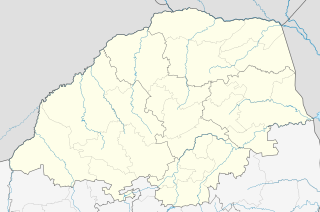Enable or Enabling can refer to one of the following:
- Enabling, a term in psychotherapy and mental health
- Enabling technology, an invention or innovation, that can be applied to drive radical change in the capabilities of a user or culture
- Enabling act, a piece of legislation by which a legislative body grants an entity power to take certain actions
- Enabling Act of 1802, authorized the residents of the eastern portion of the Northwest Territory to form the state of Ohio and join the United States
- Enabling Act of 1889, a United States statute that enabled North Dakota, South Dakota, Montana, and Washington to form state governments and to gain admission as states of the union.
- Oklahoma Enabling Act, a 1906 law which empowered the people residing in Indian Territory and Oklahoma Territory to elect delegates to a state constitutional convention and subsequently to be admitted to the union as a single state
- Standard State Zoning Enabling Act, a 1922 model law for U.S. states to enable zoning regulations in their jurisdictions
- Enabling Act of 1933 (Ermächtigungsgesetz), a 1933 Weimar constitutional amendment that gave the German Cabinet the power to enact laws without the involvement of the Reichstag
- Rules Enabling Act, a 1934 act of Congress that gave the judicial branch the power to promulgate the Federal Rules of Civil Procedure
The Enabling Act of 1802 was passed on April 30, 1802 by the Seventh Congress of the United States. This act authorized the residents of the eastern portion of the Northwest Territory to form the state of Ohio and join the U.S. on an equal footing with the other states. To accomplish this, and in doing so, the act also established the precedent and procedures for creation of future states in the western territories. The Enabling Act of 1802 would be the first appropriation by Congress for internal improvements in the country's interior.

The Enabling Act of 1889 is a United States statute that permitted the entrance of Montana and Washington into the United States of America, as well as the splitting of Territory of Dakota into two states: North Dakota and South Dakota. The Territory of Dakota was to be split on the "seventh standard parallel produced due west to the western boundary". The initial convention centers chosen for North Dakota and South Dakota were Bismarck and Sioux Falls respectively, but the latter was later changed to the city of Pierre.

The Enabling Act of 1906, in its first part, empowered the people residing in Indian Territory and Oklahoma Territory to elect delegates to a state constitutional convention and subsequently to be admitted to the union as a single union.
- Enabling clause, a clause in the 1979 Tokyo Round of the General Agreement on Tariffs and Trade (GATT)
- Enabling transformation, a compiler optimization that increases the effectiveness of other compiler optimizations
- Enabling Unit, Equal Opportunity Cell based at University College of Medical Sciences and Guru Teg Bahadur Hospital, Delhi
In psychotherapy and mental health, enabling has a positive sense of empowering individuals, or a negative sense of encouraging dysfunctional behavior.
An enabling technology is an invention or innovation, that can be applied to drive radical change in the capabilities of a user or culture. Enabling technologies are characterized by rapid development of subsequent derivative technologies, often in diverse fields. See General purpose technology.
An enabling act is a piece of legislation by which a legislative body grants an entity which depends on it the power to take certain actions. For example, enabling acts often establish government agencies to carry out specific government policies in a modern nation. The effects of enabling acts from different times and places vary widely.
Enable can also refer to:
- Enable Software, Inc., a defunct software company located in Ballston Lake, New York
- EnABLE software, software used in the oil and gas industry
- Geo-enable, the integrated use of Geographic Information
- Enable, Limpopo, a town in the Limpopo province of South Africa
- ENABLE Scotland, a Scottish charity that supports people with learning disabilities
- Enable Ireland, an Irish non-profit organisation providing free services to people with disabilities and their families
- Enable (horse), a thoroughbred racehorse, twice winner of the Prix de l'Arc de Triomphe
Enable Software was a privately held software development company located in Ballston Lake, New York. Their flagship product, called Enable was an integrated office suite for DOS-based IBM PC compatible computers. Enable was founded in 1984 by Ron Quake and Bob Hamilton.
ENABLE is a history matching and uncertainty assessment software designed to be used in the oil and gas industry. It optimizes plans and reduces costs by accelerating history matching process and improving reservoir understanding. ENABLE is also used to quantify production estimates under reservoir uncertainty. As oil and gas resources are increasingly recovered from reservoirs whose behavior has considerable uncertainty the need to measure the uncertainty is increasing . Existing reservoir simulation projects accelerate significantly and ENABLE provides assisted history matching and uncertainty forecasts.

Enable is a town in Mopani District Municipality in the Limpopo province of South Africa.
| This disambiguation page lists articles associated with the title Enabling. If an internal link led you here, you may wish to change the link to point directly to the intended article. |






